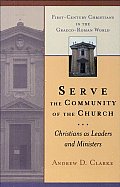Andrew Clarke’s Serve the Community of the Church, reviewed by Thang San Mung
 Andrew D. Clarke, Serve the Community of the Church: Christians as Leaders and Ministers (Grand Rapids: William B. Eerdmans Publishing Company, 2000), 305 pages, ISBN 9780802841827. This book is a recent release of Eerdmans (2000), as the second volume of the series called “First-Century Christians in the Graeco-Roman World” for the Institute of Early Christianity in the Graeco-Roman World, Cambridge. As a historical search, the book gives a fascinating socio-historical background of the New Testament which will be helpful to students of Biblical studies. However, the content will also benefit students of practical studies as its major concern is about leadership practice in the early Christian community.
Andrew D. Clarke, Serve the Community of the Church: Christians as Leaders and Ministers (Grand Rapids: William B. Eerdmans Publishing Company, 2000), 305 pages, ISBN 9780802841827. This book is a recent release of Eerdmans (2000), as the second volume of the series called “First-Century Christians in the Graeco-Roman World” for the Institute of Early Christianity in the Graeco-Roman World, Cambridge. As a historical search, the book gives a fascinating socio-historical background of the New Testament which will be helpful to students of Biblical studies. However, the content will also benefit students of practical studies as its major concern is about leadership practice in the early Christian community.
The focus of the book is to discuss “the nature of leadership in the early Christian community … taught by Paul and practiced in the congregations of the first century” (preface, ix). The book is divided into two major sections. The first of these sections mainly deals with different leadership practices of first century Graeco-Roman world, in which Christians had to locate themselves as a distinct social community. The second section is about how early Christians practiced their leadership within the church (and in front of the surrounding culture) as an application of their faith, while living in such diverse social contexts.
After first warning readers about “the hermeneutical gap” between distant Graeco-Roman world and modern society—in language, culture and philosophy—Clarke opens with a confession of the historical ambiguity related to his current topic. He promises that better answers will eventually come from the “significant wealth of archaeological finds” of recent decades (p. 5).
In part one, to overlay his background studies, Clarke categorizes five socio-political parties of Graeco-Roman world and gives detail discussion on each while indicating that how each party could undoubtedly influence the emerging Christian community. These are: wider Graeco-Roman cities and their political leadership tradition, growing Roman colonies (and cities) and their leadership system, less influential Graeco-Roman voluntary associations and their leadership practice, wide use of Roman household structure and patria potestas (absolute authority with the head) concept, and Jewish synagogue structure as the nearest leadership model for emerging Judeo-Christianity.
Category: Ministry


